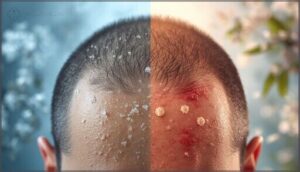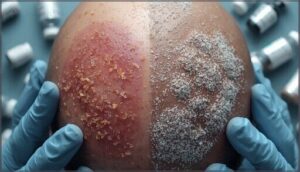This site is supported by our readers. We may earn a commission, at no cost to you, if you purchase through links.
That sharp, tingling sensation across your scalp isn’t actually your hair hurting—it’s your skin crying out for help. Your hair strands themselves have no nerve endings, but the follicles anchoring them and the scalp tissue surrounding them? They’re packed with sensitive nerves that can light up like a fire alarm when something’s wrong.
This phenomenon, called trichodynia or scalp dysesthesia, affects millions of people who describe it as feeling like their ponytail’s too tight even when their hair is down. The culprits range from inflammatory skin conditions and overzealous styling habits to stress-induced nerve sensitivity.
Understanding what’s triggering your scalp pain is the first step toward finding real relief.
Table Of Contents
Key Takeaways
- Your hair strands can’t hurt because they lack nerve endings—the pain you feel comes from inflamed follicles, irritated scalp skin, or overstimulated nerves responding to conditions like trichodynia, folliculitis, or chronic skin disorders.
- Tight hairstyles, harsh products, and untreated infections can trigger lasting follicle damage and even permanent hair loss (traction alopecia), making gentle styling and ingredient awareness essential for long-term scalp health.
- Most scalp pain resolves within days to two weeks with proper care—medicated shampoos, anti-inflammatory treatments, and switching to looser styles can dramatically reduce discomfort without prescription intervention.
- Persistent scalp tenderness lasting beyond 10 days, especially with fever, vision changes, or worsening symptoms, signals the need for professional evaluation to rule out infections, nerve conditions, or systemic disease.
Why Does My Hair Hurt?
You’ve probably felt it—that strange, uncomfortable sensation when you touch your scalp or move your hair. It’s not actually your hair that hurts, since hair strands don’t have nerve endings. What you’re experiencing is pain from your scalp itself, and several factors can trigger this discomfort.
Hair strands don’t have nerve endings—it’s your scalp itself that hurts when you feel that strange, uncomfortable sensation
Scalp Sensitivity and Nerve Pain
Your scalp’s nerve network can misfire, turning a simple ponytail into agony. This phenomenon—called trichodynia or scalp neuropathy—happens when nerve damage or central sensitization lowers your pain thresholds.
Sensory testing often reveals heightened responses to light touch, especially in the frontal and occipital regions. Neurological factors like trigeminal nerve involvement explain why ordinary scalp tenderness, numbness, or tingling feels so relentless.
Hair Follicle Inflammation
Sometimes the root of your pain lies just beneath the surface—in those tiny pockets where each strand begins. Folliculitis, an inflammatory response targeting your hair follicles, strikes up to 25% of people dealing with chronic scalp irritation. Bacteria or fungi invade these delicate structures, triggering follicular damage that feels tender, itchy, and inflamed.
Here’s what drives follicle infection:
- Bacterial overgrowth from Staphylococcus aureus
- Fungal culprits like Malassezia
- Tight hairstyles causing mechanical stress
- Heat styling that oxidizes sebum
- Occlusive headwear trapping sweat and oils
Understanding AP study resources can help individuals better manage stress and focus on their health. Targeted antimicrobial therapy usually clears symptoms within one to four weeks.
Skin Conditions Affecting The Scalp
Chronic inflammatory disorders like eczema and psoriasis often set up shop on your scalp, creating dry, itchy patches that feel tender to the touch. Scalp eczema flares with environmental irritants, while psoriasis treatment usually targets those silvery scales extending beyond your hairline.
Dermatitis management requires identifying triggers—fungal irritations from dandruff or contact reactions. Skin conditions affect 1–5% of adults, making scalp pain surprisingly common.
Understanding the literature review process can help researchers identify key factors contributing to scalp conditions.
Headaches and Neurological Causes
Migraines and tension headaches don’t just throb inside your skull—they radiate outward, turning your scalp into a tender minefield. Up to 70% of migraine sufferers experience scalp allodynia, where even brushing your hair triggers sharp pain.
Occipital neuralgia shoots nerve pain from your skull’s base upward, while trigeminal nerve issues create burning sensations around hair follicles.
Headache management often overlooks this neurological pain pattern.
Allergic Reactions to Hair Products
That shampoo you love might be sabotaging you. About 11–15% of adults develop contact dermatitis from hair products, with fragrance sensitivity and preservative allergy causing 30–70% of hair dye reactions. Nickel exposure from clips and accessories triggers localized scalp pain in up to 12% of cases.
Your scalp’s burning protest after washing? That’s allergic reactions to hair products demanding attention.
Common Causes of Scalp Pain
Scalp pain doesn’t come out of nowhere—there’s always a reason behind that uncomfortable sensation when you move your hair. From skin conditions and infections to everyday habits, the culprits are more varied than you’d expect.
Let’s break down the most common causes so you can figure out what’s really going on with your scalp.
Dandruff and Seborrheic Dermatitis
Think your scalp is just being dramatic? Dandruff and seborrheic dermatitis are real skin conditions behind that itchy scalp and scalp pain.
When Malassezia—a naturally occurring fungus—feeds on your sebum, it triggers scalp flaking and an itching sensation that won’t quit.
Treating these fungal infections with medicated shampoos containing zinc pyrithione or ketoconazole can dramatically improve sebum regulation and bring relief.
Eczema and Psoriasis
Eczema and psoriasis are chronic skin conditions that wreak havoc on your scalp through persistent inflammation and a weakened skin barrier. Genetic factors and immune response abnormalities drive these conditions, requiring expert guidance from a dermatologist to manage effectively.
Key differences to understand:
- Eczema creates dry, itchy, sometimes oozing patches with less thick scaling
- Psoriasis forms well-defined red plaques with silvery-white scales, especially at hairlines
- Both trigger scalp pain, itching, and potential hair shedding from scratching
- Treatment options include medicated shampoos, topical steroids, and targeted biologics
- Distinguishing between them requires professional evaluation of lesion appearance and distribution
Folliculitis and Scalp Infections
Bacterial folliculitis and fungal infections target your hair follicles, triggering inflammation that radiates pain across your scalp. Staphylococcus aureus causes most bacterial cases, while Trichophyton and Microsporum species drive tinea capitis—especially common in children. Untreated scalp conditions can progress to abscesses requiring drainage.
Recognizing scalp pain patterns helps distinguish between bacterial and fungal culprits. Bacterial folliculitis shows red bumps around follicles, while fungal infections create scaly patches with possible hair loss. Culture testing guides infection treatment when symptoms persist beyond two weeks or worsen despite initial care.
Here’s what sets these infections apart:
| Infection Type | Common Causes | Treatment Approach |
|---|---|---|
| Bacterial Folliculitis | Staphylococcus aureus | Topical antiseptics, oral antibiotics |
| Fungal Infections | Trichophyton, Microsporum | Antifungal therapy (griseofulvin, terbinafine) |
| Scalp Abscesses | Untreated folliculitis | Incision, drainage, antibiotics |
Sunburn and Environmental Factors
UV protection shields your scalp from acute sunburn—a major cause of scalp pain that affects 20–30% of outdoor workers during peak summer. Thinning hair increases UV penetration by up to 25%.
Climate stress, heat sensitivity, and environmental irritants aggravate existing skin conditions.
Protective hats reduce exposure by 70–90%, and scalp-friendly SPF 30+ sunscreen offers essential sunburn relief to maintain scalp health and support effective hair care.
Hair Styling Habits and Accessories
Tight hairstyles pull on follicles, triggering traction alopecia—a preventable form of hair loss and thinning that affects up to 30% of women who wear tight braids or buns regularly.
Chronic tension from hair styling and accessories damages roots over time:
- Hair ties and headbands compress the scalp, restricting circulation
- Hair clips and styling tools create pressure points that inflame follicles
- Scalp massages reverse tension, improving blood flow and easing discomfort
Symptoms Linked to Scalp Tenderness
Scalp pain doesn’t show up alone—it usually brings a few unwelcome guests along for the ride. Recognizing these symptoms early can help you pinpoint what’s causing the discomfort and get the right treatment faster.
Here’s what you might experience when your scalp decides to act up.
Itching, Burning, and Tingling
When your scalp itches, burns, or tingles, you’re experiencing real sensory changes—not just discomfort you can brush off. Up to 25% of people report clinically significant scalp pruritus, often driven by inflammation, nerve damage, or itch mechanisms that hijack normal sensation.
These sensory disorders can range from mild irritation to relentless burning sensations that demand attention and proper pruritus management to restore your scalp’s peace.
Scaly or Painful Patches
If itching and burning escalate, you may notice patchy areas that hurt to touch or reveal thick scales. Scalp inflammation often announces itself through visible lesions—whether from psoriasis, eczema, or dandruff gone haywire—that signal deeper follicle damage and active skin disease.
Key markers of painful, scaly patches include:
- Erythematous plaques with peeling or crusting
- Follicular papules tender under fingertips
- Localized hair root pain worsening with touch
- Persistent scalp irritation despite gentle care
These scalp conditions and diseases demand timely recognition.
Hair Loss and Thinning
When follicle damage deepens, hair thinning or frank hair loss may follow. Scalp inflammation drives conditions like alopecia areata—sudden bald patches—and telogen effluvium, where stress or illness triggers shedding. You’ll see widening parts, receding temples, or patchy balding patterns that signal hair regrowth cycles are disrupted.
Recognizing these hair loss conditions early improves your odds of preserving density and guiding effective hair loss prevention strategies.
Redness, Swelling, and Bleeding
When skin irritation escalates, visible redness and scalp inflammation often emerge—particularly with dermatitis or folliculitis. Swelling around hair follicles signals deeper infection or allergic reaction, and bleeding from scratching itchy patches indicates you’ve broken the skin.
Studies show that seborrheic dermatitis causes redness in 45–60% of cases, raising infection risk. Recognizing these scalp pain markers early aids bleeding prevention and faster swelling treatment.
How to Relieve Scalp Pain
Scalp pain doesn’t have to be something you just push through. Whether your discomfort comes from a skin condition, styling habits, or another trigger, relief is within reach once you know what works.
Here’s how to calm your scalp and get back to feeling like yourself again.
Gentle Hair Care Practices
Changing how you handle your hair can make all the difference when your scalp’s on edge. Swap aggressive brushing for soft brushing with a gentle, flexible-bristled tool that won’t tug at tender roots.
Try a scalp massage using nourishing hair oil—it boosts circulation and soothes inflamed nerve endings.
Keep daily routines simple: lukewarm water rinses, gentle combing from tips to roots, and smart hair hygiene practices that respect your scalp health maintenance needs.
Medicated Shampoos and Topical Treatments
When scalp inflammation has you wincing at every touch, medicated shampoos become your first line of defense. Ketoconazole formulas tackle fungal treatments for dandruff and seborrheic dermatitis, reducing tenderness by about 60% within a month. For scalp psoriasis, coal tar options ease hair pain markedly.
Pair anti-dandruff shampoos with topical creams—corticosteroid scalp pain treatment calms angry skin within weeks, giving your roots real relief.
Over-the-Counter Pain Relief
When medicated shampoos aren’t enough, OTC pain relief options can ease scalp pain while you address root causes. Acetaminophen works centrally to lift your pain threshold without inflammation control, while NSAIDs like ibuprofen target prostaglandins directly—reducing both ache and swelling at hair follicles.
- Acetaminophen (500-1000 mg): Gentle on your stomach, safer for extended scalp pain treatment
- Ibuprofen (200-400 mg): Manages inflammation-driven hair pain with anti-inflammatory action
- Naproxen (220 mg): Longer-lasting relief mechanisms for persistent discomfort
- Medication safety matters: Never exceed daily limits—liver and cardiovascular risks climb with misuse
When to Seek Prescription Medication
Over-the-counter options hit a wall when your scalp pain persists beyond 10 days or disrupts sleep, work, or daily routines. Chronic pain management often requires prescription guidelines customized to trichodynia—especially if you’re battling migraine-related hair pain or inflammatory conditions that won’t budge.
Your dermatologist can prescribe topical corticosteroids, systemic antibiotics, or neurological treatment for severe scalp pain that signals deeper trouble.
Home Remedies and Lifestyle Adjustments
Sometimes the best relief for scalp tenderness starts in your own home. Simple tweaks can ease hair pain and support long-term hair health:
- Dietary Changes: Boost iron, vitamin B12, and biotin intake to address deficiencies linked to scalp tenderness and strengthen hair care and maintenance.
- Stress Management and Relaxation Techniques: Lower tension through deep breathing or yoga, which calms nerve-related discomfort.
- Scalp Massage and Sleep Hygiene: Gentle fingertip massage improves circulation while quality rest aids your body’s natural healing.
Preventing Scalp and Hair Root Pain
Prevention is your best defense against scalp pain coming back to haunt you. You don’t need a complicated routine—just a few smart habits that protect your hair follicles and keep inflammation at bay.
Here’s what actually works to stop the pain before it starts.
Choosing Safe Hair Products
You’ll want to check product ingredients before every purchase—about 83% of adults use hair products weekly, so exposure adds up. Fragrance sensitivity contributes to 1 in 4 cosmetic dermatitis cases, while hair dye allergies affect roughly 1–2% of people in some regions.
Look for gentle formulas without harsh sulfates or alcohol to support your hair and scalp health while minimizing allergic reactions to hair products.
Proper Hair Hygiene and Brushing
Once you’ve chosen safe products, how you use them matters just as much. Regular scalp massage during gentle cleansing boosts blood flow by about 28%, while soft-bristle hair brushing from ends to roots cuts mechanical irritation by 20–30%.
These hair care tips protect hair roots and keep your scalp exfoliation routine effective:
- Rinse with lukewarm water to soothe sensitivity
- Brush just enough to detangle—not more
- Massage your scalp with fingertips, not nails
- Keep conditioner off your scalp skin
Avoiding Common Triggers
Beyond hygiene, knowing what sets off your scalp pain causes real relief. Tight ponytails and braids increase mechanical pressure on hair roots by 18%, triggering scalp tenderness that lasts days.
Here’s your trigger identification guide for allergy prevention and product safety:
| Common Trigger | Impact on Scalp | Smart Swap |
|---|---|---|
| Tight hairstyles | 18% pressure increase | Loose styles, fabric ties |
| Alcohol-based gels | Dryness, inflammation | Water-based formulas |
| Shared brushes | Infection risk (2–5%) | Personal tools only |
Scalp protection through gentle styling beats chasing cures after hair hurt begins.
Protecting Your Scalp From Sun and Stress
UV prevention isn’t just beachside advice—sun exposure triggers inflammatory flares in scalp conditions like seborrheic dermatitis, making that hair hurt worse. Stress management matters too, since cortisol-driven pathways worsen scalp pain during tough weeks.
Your scalp care essentials:
- Wear hats in intense sun to block direct UV damage
- Apply broad-spectrum sunscreen to exposed areas
- Practice mindfulness or regular exercise to lower stress-related symptoms
Protecting your scalp from sunburns and stress builds real scalp health and wellness.
Maintaining Overall Scalp Health
Long-term scalp health isn’t one thing—it’s the sum of daily habits. Regular scalp massage boosts circulation, while a healthy diet rich in iron and vitamins addresses deficiencies linked to scalp tenderness. Gentle combing and hair oiling prevent mechanical trauma, and stress reduction lowers cortisol-driven flares in skin conditions.
Consistency in hair hygiene and scalp care prevents most tenderness before it starts.
| Daily Practice | Benefit | How Often |
|---|---|---|
| Scalp massage | Improves blood flow | 2-3× weekly |
| Hair oiling | Moisturizes and protects | Weekly |
| Gentle combing | Reduces breakage | Daily |
| Stress reduction | Lowers inflammation | Ongoing |
| Balanced nutrition | Nourishes follicle health | Every meal |
Frequently Asked Questions (FAQs)
Can tight hairstyles cause permanent scalp damage?
Yes—tight ponytails and braids can damage hair follicles permanently if worn daily for over six months, leading to tension alopecia with thinning, scalp inflammation, and follicle stress that may become irreversible.
Does scalp pain indicate serious underlying disease?
Most scalp pain stems from benign causes like folliculitis or dermatitis. However, persistent tenderness with fever, vision changes, or neurological symptoms—especially in adults over 50—warrants prompt medical evaluation to rule out serious underlying conditions.
How long does typical scalp pain last?
Most scalp tenderness clears within days to two weeks, though chronic skin conditions like psoriasis may need four to twelve weeks of treatment.
Pain duration depends on your specific scalp inflammation triggers and relief strategies.
Are children more prone to scalp sensitivity?
Children’s skin barriers are less mature, making them vulnerable to Scalp Tenderness from allergies, eczema, and sun exposure. Tight hairstyles and harsh products worsen Hair Follicle inflammation in kids ages 5–
Can diet changes reduce chronic scalp pain?
While there’s no magic food cure, eating an anti-inflammatory diet rich in omega-3s, vitamin D, and zinc may ease scalp tenderness linked to nutrient deficiencies and inflammatory triggers affecting your skin conditions.
Conclusion
The good news about wondering “why does my hair hurt“ is that the pain itself signals your body’s working exactly as designed—warning you something needs attention.
Most scalp discomfort stems from fixable issues: aggressive styling, product sensitivities, or treatable skin conditions. By listening to those nerve signals instead of ignoring them, you’re already halfway to relief.
Your scalp isn’t being dramatic; it’s being direct. Respond with gentler care, and that fiery sensation will settle down.
- https://www.unboundmedicine.com/5minute/view/5-Minute-Clinical-Consult/116229/all/Folliculitis
- https://www.mayoclinic.org/diseases-conditions/folliculitis/symptoms-causes/syc-20361634
- https://pmc.ncbi.nlm.nih.gov/articles/PMC5806187
- https://www.uptodate.com/contents/seborrheic-dermatitis-in-adolescents-and-adults/print
- https://dermnetnz.org/topics/scalp-psoriasis












